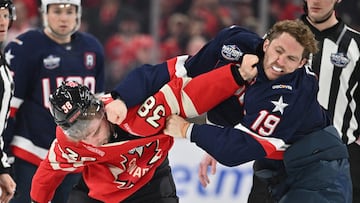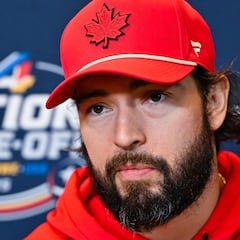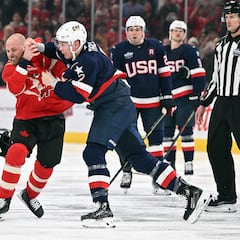The unwritten rules of fighting in hockey: A case study of the Tkachuk brothers | USA vs Canada
Fighting in hockey is part of the game and we could see that in the USA vs Canada matchup. There are unwritten rules that players and refs follow, but some fans might not know.


Ice hockey is a sport that allows fighting, which makes it one of the most entertaining sports to watch. Although there has been a decrease in recent years, fighting is still a major part of the game and serves a purpose, which we’ll try to explain for you here. The USA vs Canada match in the 4 Nations Face-Off in Montreal is a great example:
USA vs. Canada started off in MADNESS 😳
— ESPN (@espn) February 16, 2025
📺: ABC/ESPN+/Disney+ pic.twitter.com/BrWlXzMb7J
The players didn’t fight just to entertain the crowd. They dropped gloves for a reason: the USA team wanted to make a point. They wanted to let the Canadian fans and players know they were there to win and meant business. It set the tone for the game and motivated Team USA:
Brady, Matthew, and JT Miller had a group chat planning to drop the gloves tonight 😂
— Spittin' Chiclets (@spittinchiclets) February 16, 2025
pic.twitter.com/2BER9snwD5
The National Hockey League’s official rulebook states that a fight is considered official if one or more players punch or attempt to punch an opponent repeatedly. According to the rulebook, a fight can occur when two players engage in wrestling, making it challenging for the linesmen to intervene and separate them. On the ice, two players can engage in a fight, and it is also possible for multiple fights to occur simultaneously
What was Canada coach Jon Cooper's reaction to three fights in the first nine seconds of the 4 Nations Face-Off game vs. USA?
— Awful Announcing (@awfulannouncing) February 16, 2025
"Two passionate teams...This is not an All-Star Game. This is a battle of the best of the best." pic.twitter.com/WvK5Xa5ec8
The reason behind fighting in hockey
Tyson Nash, a former NHL player, who spent time with the St. Louis Blues, was known for his role as a pest to try to throw the other team off their game. He explains his role and why fighting is an important part of hockey:
“There’s a means to the madness to fighting in hockey, there’s such a purpose for all of it,” he told the guys on the Subpar podcast. “You get people off their game. They’re so worried about killing me that they’re not worried about scoring goals.”
"This is as big of a game as it gets - Saturday night, in Montreal, that was incredible.”
— Spittin' Chiclets (@spittinchiclets) February 16, 2025
The Tkachuk brothers were built for these types of moments, they also added
“We had an absolute blast from the start”
(Via: @TheFourthPeriod) pic.twitter.com/CoS8Uq3XGx
The USA vs Canada game in the 4 Nations Face-Off tournament was a great example of how fighting is more than just tough guys going toe to toe. The Tkachuk brothers set the stagefor the rest of the night with their two fights at the beginning of the game. They had been planning for it and Team USA needed some motivation after hearing their national anthem get booed and hearing the fans in Montreal cheer the Canadian players.
Related stories
There definitely is a “means to the madness.”


Complete your personal details to comment